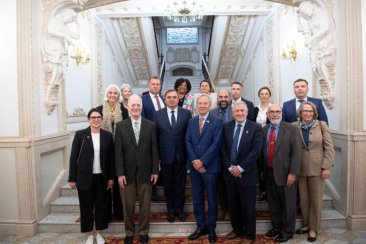Contact center of the Ukrainian Judiciary 044 207-35-46

This was stated by the President of the Supreme Court, Stanislav Kravchenko, during a meeting with a delegation of judges from the United States of America.
The delegation included Chief Justice Alison Tucher of the California Court of Appeal; Los Angeles Superior Court Judges Marguerite Downing, Robert Harrison, Laura Laesecke, Michael Linfield and Michael Vicencia; retired San Francisco Superior Court Judge Harold Kahn; San Luis Obispo Superior Court Judge Katherine Swysen; San Mateo County Superior Court Judge Michael Wendler; and U.S. District Judge David Ormon Carter for the Central District of California.
The head of the Supreme Court thanked the US government and the American people for supporting Ukraine in the war against the aggressor country, for providing defence and humanitarian aid and for exerting sanctions pressure on Russia which unleashed a war against the sovereign and independent Ukraine.
Stanislav Kravchenko stressed that the criminal actions of the Russian Federation threatened the whole world and that these actions should be properly assessed from the point of view of international law. That is why the support of the international community for the establishment of a special international tribunal to bring the top military and political leadership of the aggressor state to justice is very important for Ukraine.
In addition, the President of the Supreme Court noted that, in view of the events in Ukraine, the norms of international law should be developed so that in the future cases of unleashing an aggressive war do not recur.
Stanislav Kravchenko also said that even in the midst of war, Ukraine continued to develop as a rule of law state, improving its legislation based on international standards and remaining committed to democratic principles.

In their speeches, the representatives of the foreign delegation expressed their support for Ukraine and wished our country success and speedy victory in its struggle for freedom. The American judges expressed their willingness to provide any assistance to their Ukrainian colleagues who are now at the forefront of justice, and noted the hard work of the Ukrainian judiciary under the extremely difficult conditions of martial law.
Olena Kibenko, Judge of the Supreme Court of the Commercial Cassation Court, spoke about the peculiarities of organising the work of the courts during the war, pointing out that the possibility of holding court hearings via videoconferencing and the use of an electronic court for exchanging documents with the court had greatly simplified the organisation of the proceedings. The judge also pointed out that the volume of cases received by the Commercial Cassation Court of the Supreme Court had increased significantly compared to 2022. At the same time, the Court tries to ensure that cases are resolved as quickly as possible, as unresolved disputes in the field of economic activity hinder the proper development of the economy.
Olena Bilokon, Judge of the Supreme Court of the Civil Cassation Court, informed that since the beginning of the full-scale war, the Civil Cassation Court has received a new category of cases - the determination of the facts of civil status (birth, death) in the territory under martial law and in the temporarily occupied territories of Ukraine. To date, Ukrainian courts have considered more than 6,000 such cases. In this way, the justice system helps people in difficult situations to register their civil rights and helps those who have lived in the occupied territories to reintegrate into society.

Vitalii Urkevych, Secretary of the Grand Chamber of the Supreme Court, spoke about the structure and powers of the Grand Chamber of the Supreme Court and the reasons for referring cases to it. In his speech, the judge also drew attention to the special features of the consideration of cases of reparation in which the aggressor state is the defendant, as well as of criminal proceedings, in particular concerning the planning, unleashing and waging of an aggressive war, and of administrative proceedings concerning the imposition of sanctions on persons associated with the aggressor state.
Vitalii Urkevych also highlighted the legal positions of the Supreme Court on the absence of judicial immunity for the aggressor state. He also noted that this issue had reached the international level and that Ukraine needed the understanding and support of the international community for this approach.

Raisa Khanova, Secretary of the Judicial Chamber for Taxes, Fees and Other Obligatory Payments of the Administrative Cassation Court of the Supreme Court, said that the administrative court system is currently almost fully operational (with the exception of the Kherson District Administrative Court) and, despite the excessive workload, is fulfilling its tasks. Raisa Khanova added that thanks to the active implementation of electronic document management, the courts fortunately have no problems with access to case files.
Viktor Ostapuk, Judge of the Supreme Court of the Criminal Cassation Court, drew attention to the problems arising in the consideration of criminal proceedings in which the complainants are serving their sentences in penal colonies located in the temporarily occupied territories. The judge also stressed the importance of ensuring the uniformity of case law in war crimes cases. To this end, according to Viktor Ostapuk, judges receive regular training and share their experience in considering the relevant categories of cases.